Japan Travel Expenses: How Much Does a Trip to Japan Cost?
Latest update: November 14, 2022
Japan is considered a very expensive travel destination. In this post we are going to reveal how much money we spent traveling in Japan and how you can save money. We will give you a detailed breakdown of our travel expenses.
Due to the expectedly high costs, we were afraid of going to Japan for a long time, but at some point the desire was just too strong.
Luckily for you, we can now tell you exactly how expensive a trip to Japan really is.
In this post we have written down in detail all our travel costs in Japan and what you have to expect for your trip.
Info: We spent 3.5 weeks in Japan during the cherry blossom season and took care of the hotel search at a very late stage in our planning. During this season the hotel prices in Japan are even more expensive than usual.
Read all our posts about Japan
Japan: Cash withdrawals and currency
But before we get to the actual figures of our expenses, let’s start with the basics: Money in Japan.
In Japan you pay with yen. The exchange rate is a bit complicated, but after a while you get used to it:
100 Yen = 0.83 euros or 1 euro = 120 Yen
In Japan you still pay with cash relatively often, so we withdrew cash regularly. ATMs are not always easy to find, but there is always one somewhere.
Our tip: Turn on the location information on your mobile phone and enter “ATM” in Google Maps and let it lead you to the nearest bank machine.
However, not all ATMs work with foreign bank cards. If an ATM has nothing at all written on it in English, you probably won’t get any cash from it.
With our credit cards, the DKB Visa and the Santander 1Plus Visa, we can withdraw money worldwide for free, including Japan. It may be best to check with your bank prior to your trip, to find out what costs may be incurred in Japan.
Some ATM operators charge an additional fee of 210 yen (1.75 euro) for a withdrawal. No fees are charged at the ATMs of the Japanese Post (JP) and the Seven Bank (part of the supermarket chain 7/11).
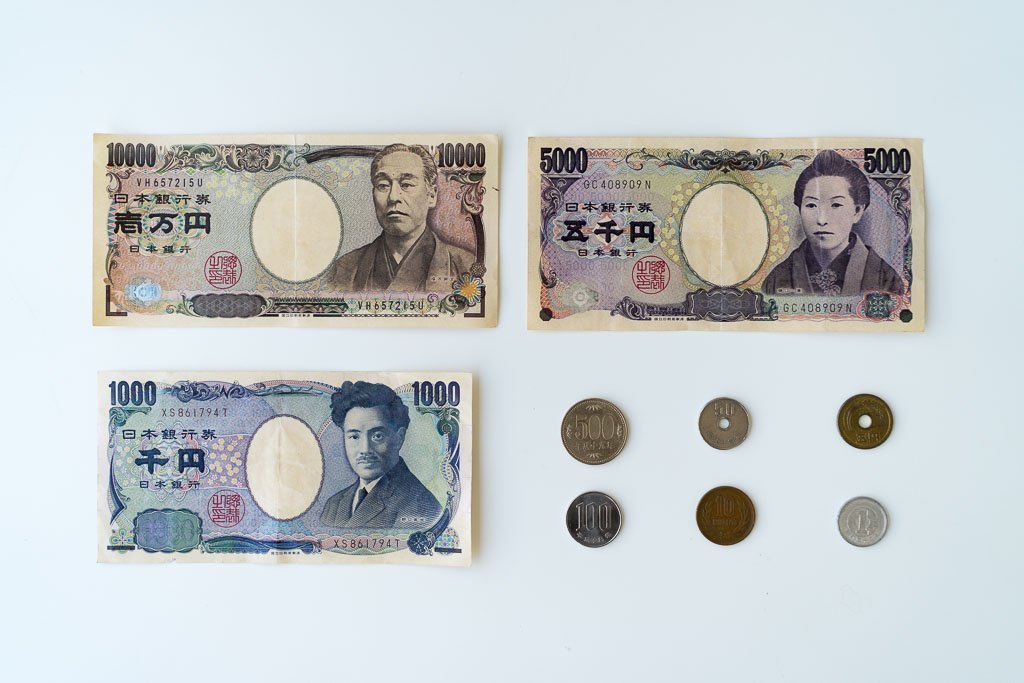
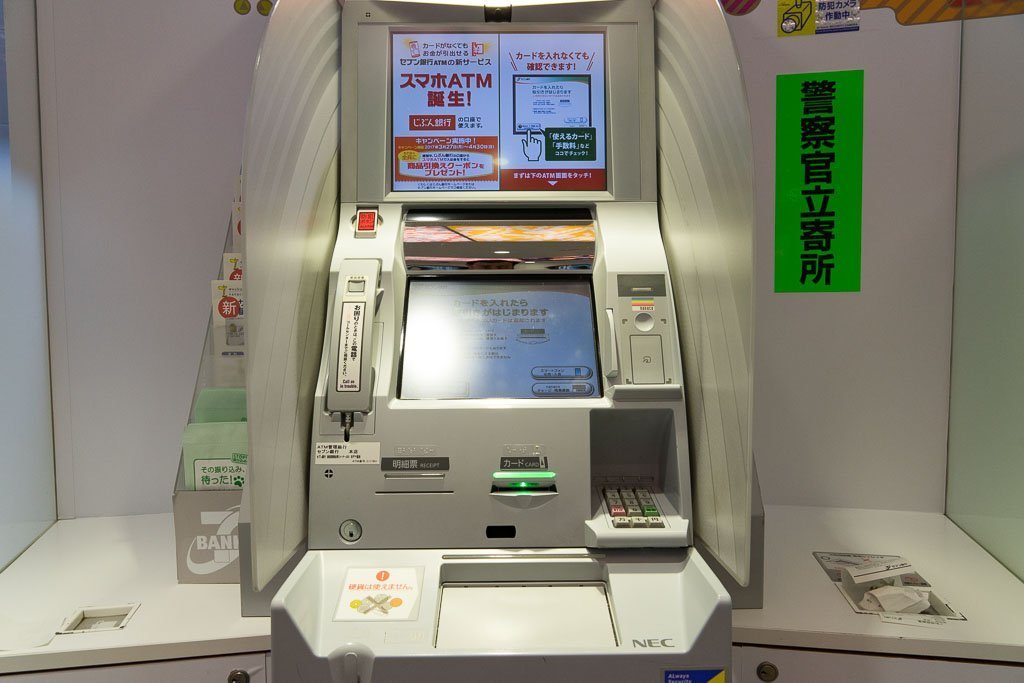
Expenses in Japan: How much does Japan cost?
Even though Japan is considered an expensive travel destination with good reason, it is not so expensive in all aspects. We compared the prices for different things with the prices in Germany and will show you what is more expensive in Japan, what is cheaper and what costs exactly as much as in Germany.
This is less expensive in Japan than in Germany
Sushi:
Eating sushi in Japan is not only significantly tastier, but also cheaper than in Germany. At a conveyor belt Sushi you get a plate with two Nigiri starting from 108 Yen (0,90 euro).
For less than 10 euros you can eat plenty of sushi there. Of course there is also much more expensive sushi, but the quality of the sushi that you get for your money is much better in Japan than in Germany.
Public transport:
Public transport in cities is generally cheaper than in Germany. In the big cities, a ride on the subway costs the equivalent of 1.50 euro to 2.00 euros. In German cities you can get a short-distance ticket for that, if you are lucky.
Public toilets:
Maybe that doesn’t really make a difference in the travel budget, but it is still very pleasant. Not only are there public toilets everywhere in Japan, they are also mostly clean and always free of charge.
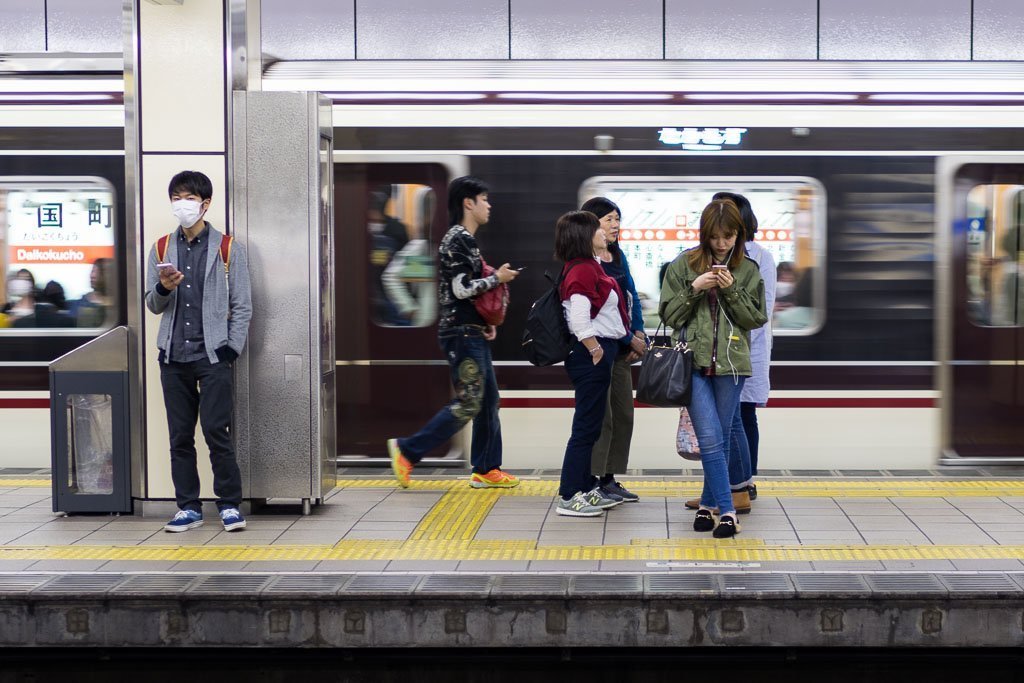
This is more expensive in Japan than in Germany
Hotels:
Unfortunately, a not insignificant point concerning travel expenses are the prices for accommodation. Especially the costs for hotels in Tokyo, Osaka and Kyoto are significantly higher than in Germany.
A simple mid-range room, which often only measures around 10 square metres, costs between 120 and 160 euros per night. Beds in hostels start at 30 euros per night.
In our Japan hotel tips post we have listed all our hotels and give you general tips for hotel bookings in Japan.
Beer:
Beer is relatively expensive in restaurants and bars in Japan. The prices for a small beer (about 0.35 liters) vary between 350 and 1,000 Yen (3-8 euros). The price level for wine and cocktails is not as high.
Western food:
If you feel like a pizza or a burger during your trip to Japan, you have to dig deeper into your pocket than in Germany. Prices from 15 euros upwards are not uncommon here.
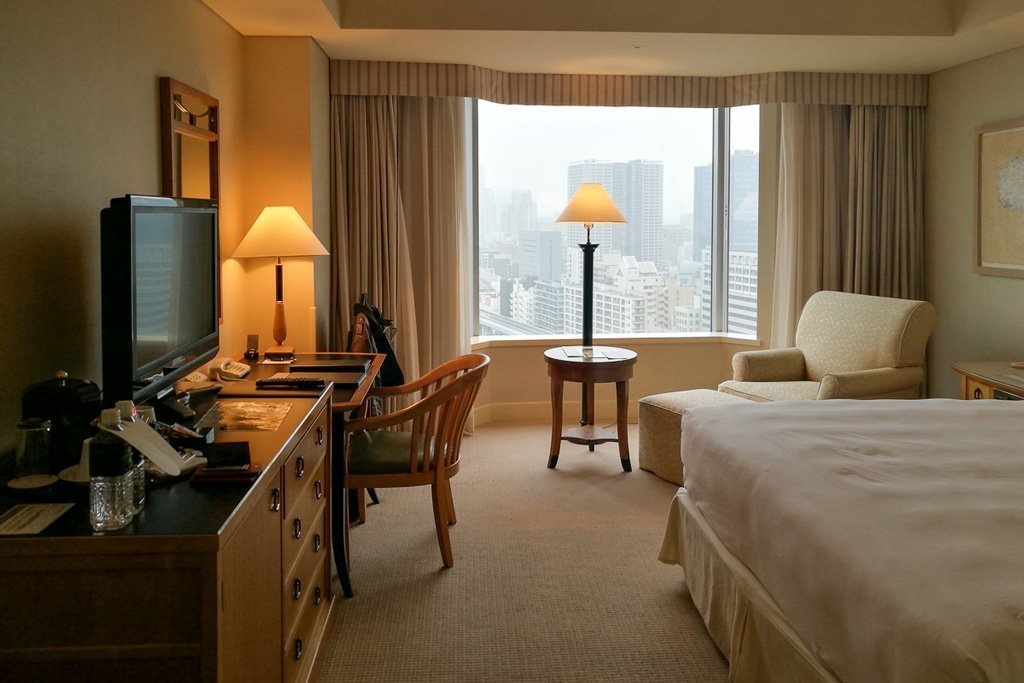
This costs as much in Japan as in Germany.
Train:
Traveling by train in Japan is fast and comfortable, but unfortunately about as expensive as in Germany. A trip from Tokyo to Hiroshima (800 km) costs the equivalent of 155 euros, which is about the same as a trip with the ICE from Hamburg to Munich (800 km, 145 euros).
Electronics:
Of course, in the homeland of the big camera manufacturers, we also looked to see if there were any bargains.
Unfortunately there were none. Cameras, lenses and other electronics cost about as much as in Germany.
Even if it might be a little bit cheaper, we would advise you not to buy a camera or other electronic equipment in Japan, because in warranty cases it becomes difficult if the things were bought abroad.
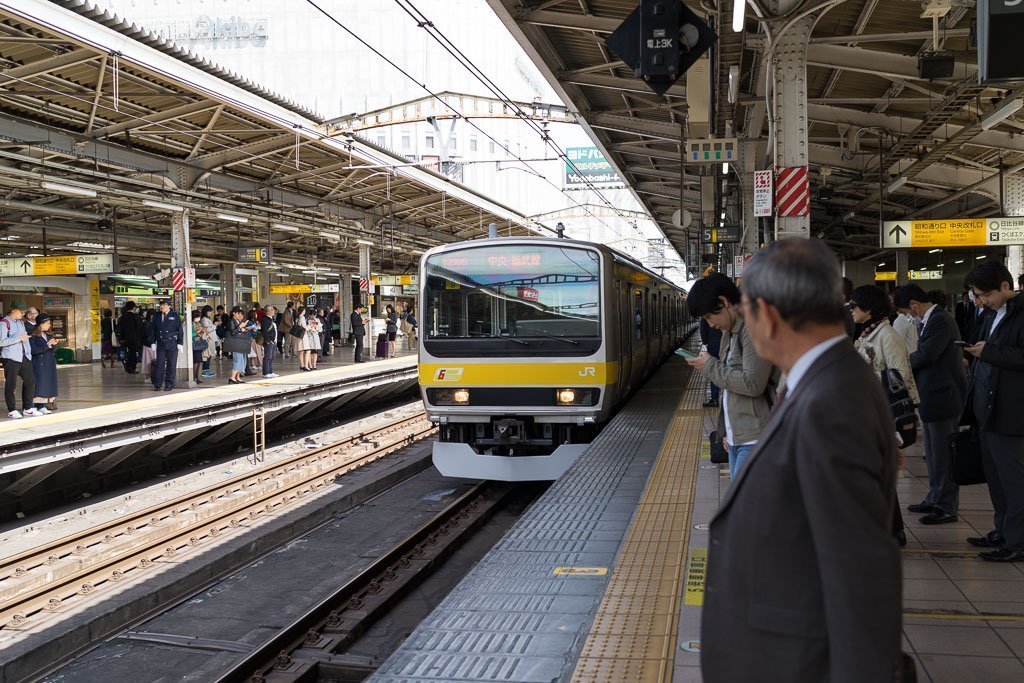
Our travel expenses in Japan
Now, as promised, you get to look behind the scenes. We listed exactly how much money we spent on our trip to Japan.
Our costs for overnight stays in Japan
As already mentioned, the price level for accommodation in Japan is high. Even though we only slept in average mid-range hotels (2-3 star standard), this was the biggest part of our expenses.
This is what we paid:
Tokyo: Super Hotel Lohas Akasaka 11 m² – 141 euros/night
Osaka: Hotel Cordia 18 m² – 147,50 euros/night
Kyoto: Hotel Washington 9 m² – 144 euros/night
Hiroshima: Hotel Washington 18 m² – 75 euros/night
Miyajima: Oyado Tsukiusagi 20 m² – 113 euros/night
Regarding the prices we have to add that we were in Japan during the cherry blossom season, one of the two main travel seasons.
In the period from the end of March to the middle of April, of the Golden Week at the beginning of May, as well as in autumn, the prices for accommodation are the highest in Japan.
Average cost per day: 135 euros
Total cost for 3 weeks: 2,845 euros (for two)
More info: In our post about our hotels in Japan, you’ll find more information and practical tips for your hotel booking.
Our expenses for food and beverages in Japan
Breakfast is usually not included in the hotels, but must be booked additionally.
As in the simple hotels, the breakfast is usually oriented to the Japanese taste and is also not quite cheap, we usually ate out for breakfast.
We also went out for lunch and dinner. We never ate in very expensive restaurants, but often had sushi (10 euros per person), ramen or udon soup (5-9 euros per person).
We also didn’t drink much alcohol, from time to time we had a beer or a glass of wine for dinner.
Average cost per day: 56,50 euros
Total cost for 3 weeks: 1,300 euros (for two)
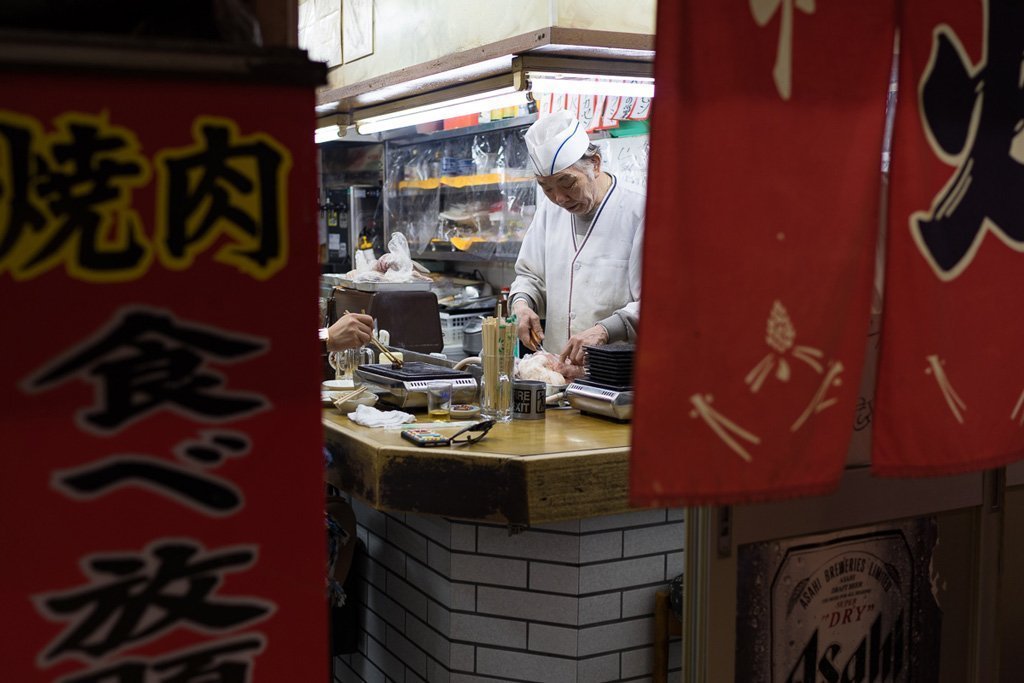
Costs of transportation in Japan
The transportation costs, to get from A to B, made up a relatively large portion of our Japan travel expenses.
For the train journeys between the cities we had the Japan Rail (JR) Pass for 21 days, which cost 490 euros per person. You can order the pass online here.
Find our detailed experience report here: Japan Rail Pass experiences.
For subway and bus tickets as well as private regional trains, which were not included in the JR Pass, we spent a total of 262 euros.
Costs for the Japan Rail Pass: 980 euros
Further transportation costs: 262 euros
Total costs for 3 weeks: 1,242 euros (for two)
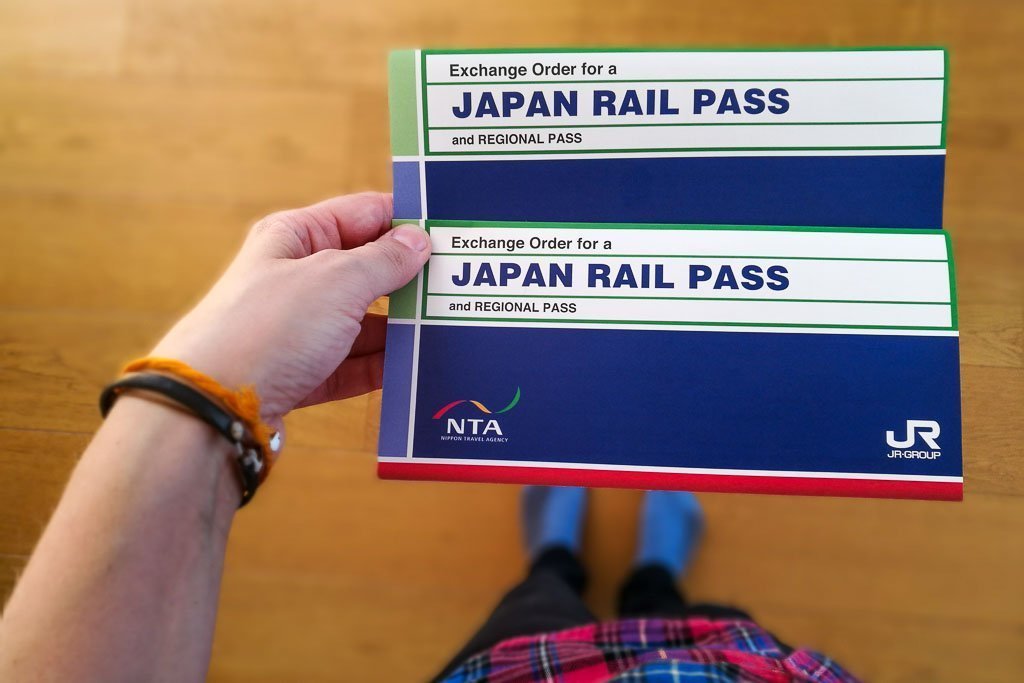
Entrance Fees in Japan
Many temples and sight-seeing attractions in Japan cost admission. This is usually only a few euros, but in three weeks it can easily add up to a rather high amount.
The entrance fee for temples is usually between 200 to 600 Yen (1,50 to 5 euros). More expensive are viewpoints, as for example in Tokyo and Osaka. Here the prices range from 600 yen (5 euros) to 3,000 yen (25 euros).
Especially the visit of the Robot Restaurant in Tokyo was expensive (65 euros per person). Such special things are always quite pricey in Japan. This is also true, for example, for a visit to a sumo wrestling match or a sumo training center (approx. 100 euros). But we didn’t do that.
Total entrance fees on our trip: 375 euros (for two)
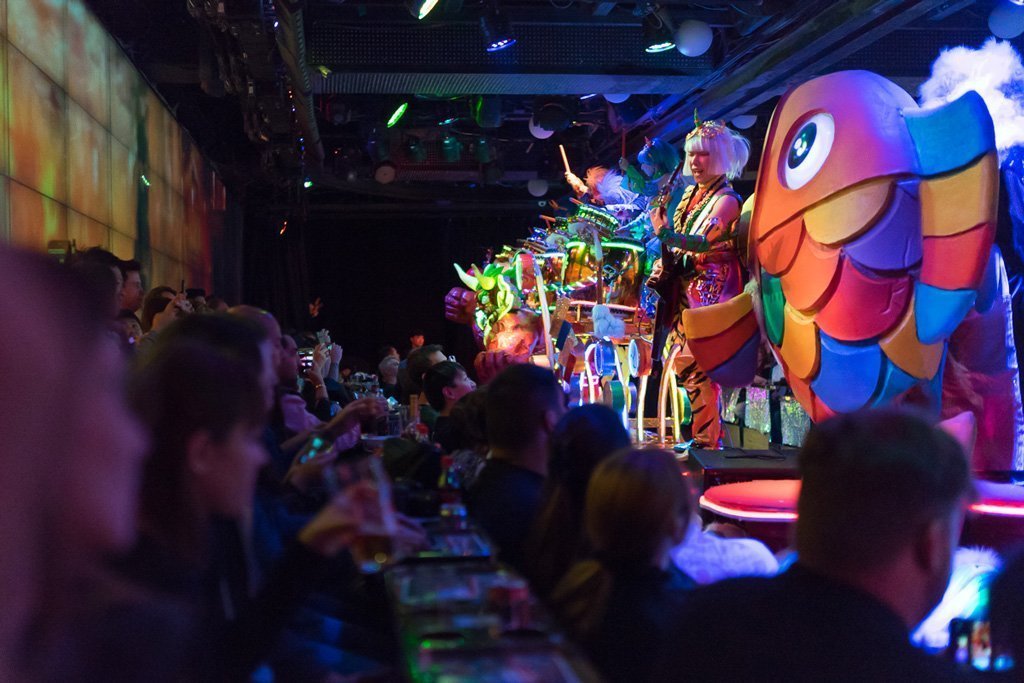
Costs for flights to Japan
Of course, the costs at the destination are not the only thing, you have to come to Japan first. The prices for flights from Germany are not particularly expensive, but also not excessively cheap.
As so often, the best prices are offered by the Arab airlines. But it is also worth taking a look at European airlines such as Finnair. They are often just a little more expensive, but usually faster.
We paid 806 euros per person for our flight with Emirates from Hamburg via Dubai to Tokyo and back. With a bit of luck, this could also be a little bit cheaper, but a total of 800 euros is a realistic price for a flight to Japan.
We recommend the flight search engine Skyscanner when searching for the optimal flight.
Costs per person: 806 euros
Total costs: 1,612 euros
Summary of our Japan travel expenses
And here is an overview of everything:
Accommodation: 2,845 euros
Food and beverages: 1,300 euros
Transportation: 1,242 euros
Admission: 375 euros
Flights: 1,612 euros
In total, we paid just under 7,400 euros for our entire trip to Japan, including the flight, that is 3,700 euros per person. The costs at the destination were about 275 euros for two persons per day.
Tipping in Japan
Tipping is absolutely not common in Japan. No tips are expected in restaurants, bars or taxi rides. Nobody will understand if you want to give a tip, so you better not. Otherwise it could actually be taken as an insult.
Apparently only in very expensive hotels it is common to tip the room service or a suitcase carrier. But we can’t confirm that.
Tips for saving money in Japan
We didn’t pinch pennies on our journey. Of course it could have been a bit cheaper here or there, but we didn’t fling away the money either.
You can also travel to Japan cheaper and we would like to give you a few tips on how to do that:
Tip 1: Overnight stay in a Manga Café
That sounds funny, but it’s actually not so bad.
There are often so-called Manga Kissas in Japan where you can rent a room to play computer games.
There is usually a shower and a very comfortable armchair or couch and you can also rent these rooms overnight.
This is definitely cheaper than a hotel in some places.
Tip 2: Get food from supermarkets
The three most popular supermarket chains in Japan are Family Mart, Lawson and 7/11. All three have a good selection of ready-made meals, sushi boxes and Onigiri, which are for example also eaten by many Japanese at lunch break.
The quality of the food is not that bad and it is much cheaper than in a restaurant. By the way, in all supermarkets you can get quite good coffee for the equivalent of 1,00 to 1,50 euro.
Tip 3: Travel in the low season
Most tourists come to Japan in spring and autumn. Then the weather is generally better and in spring you can see the famous cherry blossoms and in autumn many bright colors.
Overnight stays outside the main season are of course much cheaper. But you have to be prepared for hot, rainy summers or uncomfortable winter weather.
Our conclusion: How much does a trip to Japan cost?
Japan is definitely not a cheap travel destination. Compared to many other Asian countries, such as Thailand, Myanmar or Sri Lanka, Japan is extremely expensive.
However, compared to European destinations it is not that much more expensive. Japan is certainly not the first choice for budget backpackers, but it is definitely an option for everyone else.
Do you have any tips on saving money in Japan? How much did you spend on your trip to Japan? We are looking forward to your experiences and your comments.
